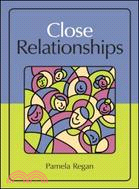"Pamela Regan has given us the book to invite, engage, inspire and instruct the next generations of scholars in the exciting ... work of relationship science. ... Close Relationship informs, challenges, and charms. Our field and our lives can only be better for the comprehensiveness nd vision in Dr. Regan's work."-Ann L. Weber, University of North Carolina at Asheville, USA
"This text contributes significantly to the field because of its emphasis on science, research findings, theoretical concepts, and multiple types of relationships. Dr. Regan is a superb writer, ... [It is] most appropriate for a course on Personal Reltionship ... [or] ... as a supplementary text for a course on marriage and the family."-Susan Sprecher, Illinois State University, USA
"A `reader-friendly', intelligent review that draws on a range of theoretical perspectives and will appeal to a wide range of undergraduate and graduate students."-Robin Goodwin, Brunel University, London
"An excellent overview of relationship studies ... the material [is] easy for undergraduates to read and follow. ... Dr. Regan writes well ... [and she] is a respected scholar."-Lawrence Ganong, University of Missouri, Columbia, USA
This multidisciplinary text introduces the concepts, methodologies, theories and empirical findings of the field of interpersonal relationships. Information is drawn from psychology, communication, family studies, marriage and family therapy, social work, sociology, anthropology, the health science, and other disciplines. Numerous examples capture readers' attention by demonstrating how the material is relevant to their lives.
Active learning is encouraged throughout. Each chapter includes an outline to guide students, key terms and definitions to help identify critical concepts, and exploration exercises to promote active thinking. Many chapters include measurement instruments that students can take and score themselves. A website for instructors features a test bank and PowerPoints for each chapter.
The book opens by examining the fundamental principles of relationship science alone with the research methods commonly used. The uniquely social nature of humans is then explored including the impact relationships have on health and well-being. Part 2 focuses on relationship development-from attraction to initiation to development and maintenance as well as the factors that guide mate choice and marriage. The development of relationships among friends and romantic partners is explored. Part 3 examines the processes that shape our interpersonal experiences, including cognitive (thinking) and affective (feeling) processes, communicative and supportive processes, and the dynamics of love and sex. The book concludes with relationship challenges-rejection and betrayal; aggregation and violence, conflict and loss; and therapeutic intervention.
Intended as a text for courses in interpersonal/close relationships taught in psychology, communication, sociology, anthropology, human development family studies, marriage and family therapy, and social will also appreciate this engaging overview of the field.












